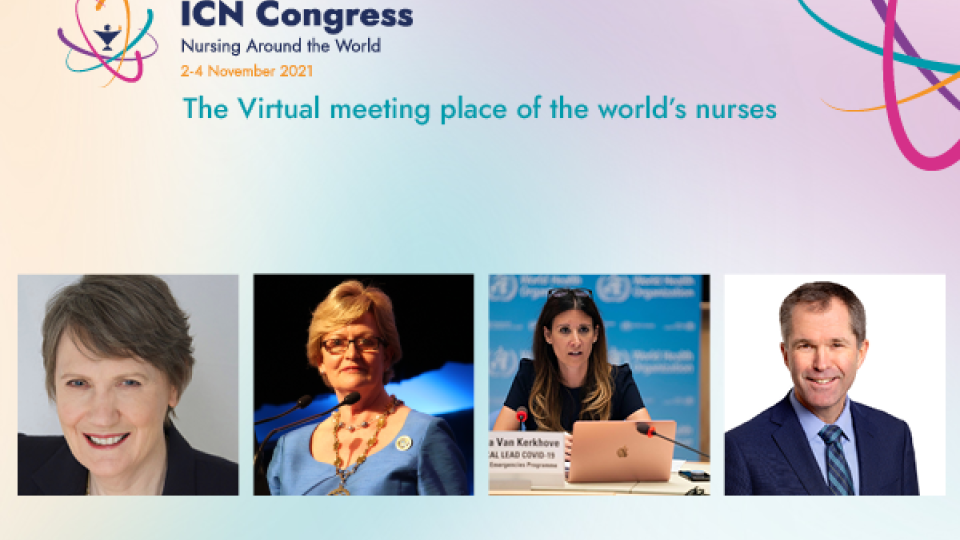ICN Congress hears Former New Zealand Premier Helen Clark call for nurses’ voices to be heard at World Health Assembly discussion on future pandemics

Former Prime Minister of New Zealand Helen Clark, has called for the World Health Assembly (WHA) to listen to the International Council of Nurses (ICN) in its deliberations over a possible pandemic preparedness treaty.
Ms Clark, who was Co-chair of the World Health Organization (WHO) Independent Panel for Pandemic Preparedness and Response, criticised the G20 Group of Nations for not giving any concrete proposals on improving the global vaccine roll out, and said nurses everywhere should raise their voices to encourage their governments to take action as soon as possible.
Speaking at a session at ICN’s virtual Congress, Ms Clark called on ICN’s member National Nursing Associations to lobby their governments, and said ICN’s voice should be heard at the World Health Assembly (WHA) special session later this month, which will discuss a new WHO convention on governments’ responsibilities regarding pandemic preparedness and response.
“I think the voice of the ICN on what the WHA could usefully do at the special session would be extremely important.”
Ms Clark was moderating a session about the lessons learned from the global response to COVID-19 and how to prevent future pandemics.
The discussion, which was presented by ICN Chief Executive Officer Howard Catton, included contributions from ICN President Annette Kennedy, Ambassador for Global Health at the Norwegian Ministry of Foreign Affairs Prof John-Arne Røttingen and World Health Organization COVID-19 Technical Lead Dr Maria Van Kerkhove.
Ms Clark started the session by acknowledging the strains nurses around the world have been under.
“Let me acknowledge up front the burden the nurses of the world have carried on the front lines, often not properly protected themselves, going the extra mile for the sick, the dying, doing whatever they could.”
Ms Clark described the evidence nurses had given to the panel she chaired, including their concerns about burnout, retention of the workforce and recruitment of new nurses.
Ms Kennedy spoke about how badly the world’s nurses had been let down, especially at the beginning of the pandemic, when many nurses were working without personal protective equipment (PPE) in what was a deadly environment.
“PPE was the most important issue in preventing the spread of the virus. If you sent an army to war, you wouldn’t expect them to go to war without protective equipment. Yet we were expecting nurses to go into highly contagious situations with little or no protective clothing. We were effectively sending them into their deaths.”
Much of the discussion focused on the issue of vaccine inequity, with many high-income countries starting to give third ‘booster’ vaccinations to their populations or hoarding vaccines, while many low- and middle-income countries had hardly stared their vaccination programmes.
Professor Røttingen said all communities need to be able to implement a comprehensive package, rather than one single solution – such as relying on vaccines only - and to do so, they need capacity and the necessary supply of available equipment and technologies. “This is true for now, in the crisis, but it is also true for preparedness for the next pandemic or the next outbreak of infections. It illustrates that we are dependent on each other, and that preparedness is really about the weakest link problem. We need to see it as a collective responsibility across all countries to make sure that their system is sufficiently robust. Proper global health preparedness is a global public good and investment needs to be made to make sure that we are all properly protected.”
Dr Van Kerkhove said delivering booster jabs or storing and hoarding doses of the vaccine was delaying the end of the pandemic and risking the development of new and dangerous variants.
Dr Van Kerkhove said: “Most people around the world have not received their first and second doses. The vaccines that are available now are effective against the Delta variant, but Delta is evolving, it may develop some immune escape properties and we may have reduced protection against the virus.
‘But WHO has been extremely clear on the use of boosters, calling for a moratorium by the end of the year. The amount of boosters that are being used right now for people who are already well protected at the expense of others, and in particular, our health workers, the people who are on the front lines in those countries is disturbing. It is absolutely outrageous, and I think everybody has a role to play in fighting against this. Too many vaccines are going wasted and frankly, this inappropriate use of the vaccine right now is prolonging the pandemic.”
Speaking after the session, ICN Chief Executive Officer Howard Catton said nurses understand the consequences of government decisions in the health of the patients they treat.
“The pandemic has shown how nurses around the world have come together to share information and provide support to each other. When Helen Clark, the Co-chair of the WHO Independent Panel for Pandemic Preparedness and Response, says ICN should tell WHO what our associations think, it shows that what nurses think matters on the stage where the world’s most important decisions about healthcare take place. Nurses, through ICN, are an important social movement for good, for progress and improvement, for a better, heathier world, and we are going to continue that work and to grow our influence wherever it can make a difference.”
The ICN Congress is currently underway virtually. For more information go to: https://icncongress2021.org/
Download the press release here